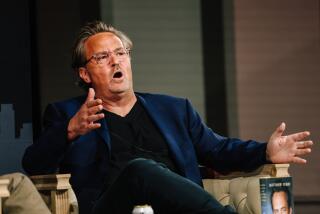Medical Examiner Rules Biologist’s Death the Result of Accidental Fall From Bridge
- Share via
ATLANTA — A prominent Harvard University biologist, whose body was found in the Mississippi River last month five weeks after he had mysteriously disappeared from a medical conference in Memphis, died accidentally when he fell from a bridge after a minor auto mishap, a medical examiner reported Monday.
The finding, issued in Memphis, ruled out murder and suicide, and suggested that Don C. Wiley, 57, was impaired that night and tumbled over the bridge’s railing, which was only about 3 1/2 feet high. His body was recovered from the river on Dec. 20 about 300 miles south of Memphis.
He fell 135 feet from the Hernando DeSoto Bridge, less than a mile from the hotel where he had just attended a meeting and banquet. The medical examiner said that Wiley died after striking a beam on the way down and hitting the water at a speed greater than 60 mph, causing fractures and paralysis.
Wiley’s disappearance Nov. 16--when the nation was preoccupied with fears of anthrax--raised questions about whether his death was related to bioterrorism. He was a nationally known expert on a number of viruses, including Ebola, which scientists believe could be used in terrorist attacks. The FBI initially showed interest in the case.
But in a report issued in Memphis, Shelby County Medical Examiner O.C. Smith said that Wiley had “an infrequent and poorly understood seizure disorder” that he kept private and for which he was not being treated.
Stress, fatigue and alcohol can bring on the disorder, Smith said. The medical examiner noted that Wiley’s rental car appeared to have hit a construction sign and the bridge itself. He may have gotten out to inspect the damage.
“It will never be known if this disorder or drowsy driving [was] due to the late hour and long day Dr. Wiley had put in, or [if] the effects of alcohol he was seen to imbibe earlier contributed to the incident on the bridge,” the medical examiner said in his report.
“Toxicology studies are not yet complete, but alcohol has been identified at levels suggesting impairment,” the report says.
Smith said the alcohol level in Wiley’s body was 0.17%, but he stressed that this measurement was from the chest cavity and not from blood because no blood remained in Wiley’s vessels.
“I would defy any expert,” said Smith, “who would come up with a solid number that would adequately define what his true blood-alcohol was at the time of the mishap.”
Smith added that suicide had been ruled out after a review of Wiley’s medical records and past behavior.
The report raised the possibility that a passing 18-wheel truck may have caused the roadway to bounce or produced a gust of wind which could have contributed to Wiley’s fall.
In Cambridge, Mass., Wiley’s widow, Katrin Valgeirsdottir, said only, “I’m glad it’s over.” She declined to discuss her husband’s medical condition.
Smith stressed that Wiley’s family had been “very forthcoming” about his medical history.
“Dr. Wiley was very, very private with regard to this condition,” the medical examiner said. “He never had it worked up medically. He was never taking any medication for it. It was something that happened relatively infrequently, and he tried to handle it himself.”
Smith said the condition could appear after vigorous physical activity such as running. “What we looked for very closely in the autopsy, in the investigation of the bridge and of the vehicle, were signs of just what actually occurred,” he said.
“The fact he had two mishaps with the vehicle suggested some sort of impairment,” the medical examiner added.
Wiley, a professor of biochemistry and biophysics at Harvard whose work focused on the structure of viruses and proteins in the immune system, was reported missing Nov. 16.
In 1999, he won the prestigious Japan Prize with his Harvard colleague, professor Jack L. Strominger, for discoveries related to the functioning of the body’s immune system. Wiley had traveled to Memphis to attend a two-day meeting of the scientific advisory board of the St. Jude Children’s Research Hospital.
*
Times staff writer Elizabeth Mehren contributed to this report.
More to Read
Sign up for Essential California
The most important California stories and recommendations in your inbox every morning.
You may occasionally receive promotional content from the Los Angeles Times.








